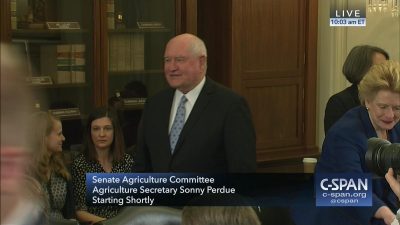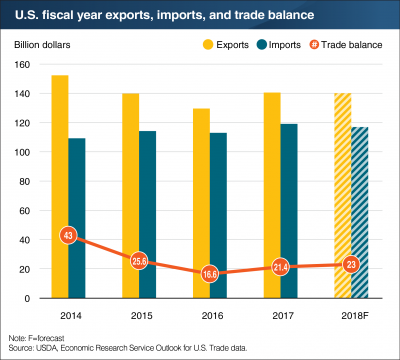A prolonged military conflict in the Middle East could potentially upend key commodity markets due to Iran’s control of the Strait of Hormuz, one of the world’s most important trade…
Secretary Perdue Discusses the State of Rural America at Senate Ag Committee Hearing- Focus on Trade, RFS
On the one-year anniversary of being confirmed by the Senate as the 31st U.S. Secretary of Agriculture, former Georgia Governor Sonny Perdue delivered testimony on Tuesday to the Senate Agriculture Committee at a hearing titled, “The State of Rural America.” Sec. Perdue was quizzed by Senators about a variety of issues, including trade and the Renewable Fuel Standard (RFS).
Trade
In his opening remarks, Committee Chairman Pat Roberts (R., Kan.) noted that, “Producers in Kansas and all across the country are going through a rough patch in the agricultural economy. Over the past five years, prices for many of our major commodities have dropped by over 40 percent. As a result, net farm income is expected to decline by 52 percent.
The ongoing pressure of low commodity prices continues the need for a high volume of sales. Now more than ever, producers need certainty and predictability – and a partner in government that can help steady the ship and right the course.
Committee Ranking Member Debbie Stabenow (D., Mich.) pointed out that, “Unfortunately, the struggles with low commodity prices have been compounded by uncertainty around trade. And, I share Chairman Roberts’ concerns on this. I believe we need tough trade enforcement when countries like China break the rules – but we must do everything we can to ensure there are no unintended consequences for our farmers.”

In his opening remarks, Sec. Perdue noted that in fiscal year 2017, “Farm and food exports were the third- highest on record at approximately $140.5 billion.”

During the discussion portion of Tuesday’s hearing, Chairman Roberts queried: Mr. Secretary, in your view, where does U.S. agriculture rank as a priority regarding trade policy decisions that both have been and will be made?”
Sec. Perdue reminded the Committee that President Trump had considered withdrawing from the North American Free Trade Agreement (NAFTA) late last April, right around the time he was confirmed as Secretary. Sec Perdue intervened by bringing a map into an Oval Office meeting demonstrating that agricultural areas would be hard particularly hard by this action. “And he relented, thankfully, in that. I’m hopeful that we will see a successful NAFTA conclusion here shortly,” Sec. Perdue noted.
Sec. Perdue added, “But the administration knows full well. They’ve got a lot of support in the farm area. They want to be with them. But there is concern over their livelihood. And really, I think a legitimate anxiety that we’ve communicated to the President and to the cabinet. We’ve discussed, obviously, your proposal that we want trade and we want open new markets rather than aid.
“But I think it’s my responsibility incumbent on me also to look at any kind of mitigation strategies from a USDA perspective in case those negotiations don’t take effect.”
Chairman Roberts responded by saying, “The point I’d like to make is that in the realm of negotiation, any statement that is being made, even though it is not conclusive with regards to finalizing any negotiation, is market sensitive.
I think you could even say that in some cases we’re using farmers, ranchers, growers as a pawn with regards to trying to get there from here on a better trade agreement. That’s pretty strong words. I don’t mean that in an accusatory fashion. That’s just the way it is.
Sec. Perdue stated that, “So our position actually is to—and I have to go back to the President looking me in the eye and saying, you know, Sonny, I know that farmers out here are worried about what we’re doing, but you need to tell them that I’m not going to let them be the casualties in this trade dispute.”
In response to a question from Sen. John Hoeven (R., N.D.), Sec. Perdue highlighted some points of success the executive branch has had in the area of agricultural trade, “We’ve had some success over the last year. Most notable, obviously, is beef back into China after 13 years. We just announced pork back into Argentina since 1992.
“We’ve negotiated U.S. rice into China for the first time ever. We’ve still got some technical details to work out there. Lifted South Korea’s ban on poultry imports. We’ve eased the regulations on U.S. citrus in the E.U., and we’ve resumed distillers grains back into Vietnam. Hope to get back into China after this upset is, and the reentry of chipping potatoes into Japan.”
In response to a question from Sen. Heidi Heitkamp (D. N.D.), Sec. Perdue also highlighted the recent modifications to the U.S.-Republic of Korea Free Trade Agreement (KORUS).
However, Sen. Heitkamp noted, “But could you tell me what was in the renegotiation for agriculture?”
Sec. Perdue acknowledged, “Not a lot,” then added, “But you know what the demand was, do no harm in that area…I think in light of the threat of withdrawal, it was a net [positive].”
AUDIO CLIP: At @SenateAgGOP hearing, @ChuckGrassley asks @SecretarySonny about potential @USDA assistance for #farmers if prices drop dramatically due to going over the brink on #trade https://t.co/TVvmg24xeq (MP3- 90 seconds) pic.twitter.com/xJ0Swj5HjW
— Farm Policy (@FarmPolicy) April 24, 2018
Sen. Chuck Grassley (R, Iowa) asked Sec. Perdue about potential USDA assistance for farmers “if prices drop dramatically because of going over the brink [on trade].”
Sec. Perdue stated that, “We all are aware, the press has reported some of those authorities have to do with Section 32 and the CCC authority we’re given here. We’ve got to be very careful in how we administer that, though, because farmers, as you know, would rather have a fair price for a good crop than a government check. So we don’t want to set a precedent of an expectation that we can’t live up to.
“We’re trying to evaluate this on a weekly basis, what is the trade dispute damage out here, and when do we act. Sorghum probably is at the tip of the spear right now with the recent 178.9% tariffs that way. And we’re meeting with the sorghum people trying to determine what are the long-term effects.”
My economists tell me they have models that can tell them what is the impact of the specific trade disruption, and that’s what we want to account for, not just regular market forces.
Meanwhile, Washington Post writer Erica Werner reported yesterday that, “Agriculture Secretary Sonny Perdue told senators Tuesday that he’s encouraging President Trump to consider rejoining the Trans-Pacific Partnership, the 11-nation trade deal the president pulled out of days after taking office.
“Perdue’s comment is the latest mixed signal from the Trump administration over the TPP, which Trump recently told senators he’s open to rejoining, only to subsequently suggest over Twitter that he’s not.
“The agriculture secretary’s statement came at a Senate Agriculture Committee hearing in response to a question from Sen. Steve Daines (R-Mont.).”
Renewable Fuel Standard
Several Senators asked Sec. Perdue about issues associated with the Renewable Fuel Standard (RFS), including Joni Ernst (R., Iowa), who noted, “The EPA has granted about 25 small refinery hardship waivers. Some of these refineries are neither small nor facing hardships. So these waivers, to me, are unacceptable. And last week, and again today, you agreed that these waivers, like the one Andeavor received, constitute demand destruction for biofuels. So what will you do specifically to ensure that the EPA is not deliberately circumventing the RFS?”
Sec. Perdue stated, “Well, Senator, you know statutorily I don’t have any kind of hammer. What I do have is the power of persuasion with the administrator and the President to make sure that they are aware that we are aware. And we had to dig pretty deeply to get the number of gallons that had been waived this year, and with the President and his team let them understand how the instructions that he was given last fall over maintaining the RVO obligation at 15 billion gallons has essentially been circumvented by the waivers. And that’s what it is. We have no legal, statutory authority to do anything other than that, other than letting the administration know, as well as the administrator know, that our farmers and our biofuel producers are very concerned about that.”
Sen. Ernst also asked, “Have you spoken with Administrator Pruitt regarding the E15 waiver—the RVP waiver year round? Have you spoken with him recently? And how is it that we can move ahead with that?”

In reply, Sec. Perdue indicated that, “Multiple times. Obviously the administrator’s position was his concern over RIN prices. My words to him is these waivers have been the antidote to RIN prices in what he’s already done, so that I would encourage him, and have actually exhorted him to do the E15 waiver, as I have the President.”
“The President will probably make that call. And you heard what his statement was in the meeting which we attended. And I am encouraging the President to go ahead and make good on that commitment to do that while letting the industry, the petroleum industry, know that the waivers granted have been the essence of any kind of RIN cap, an effective RIN cap that they have enjoyed this year already.”





